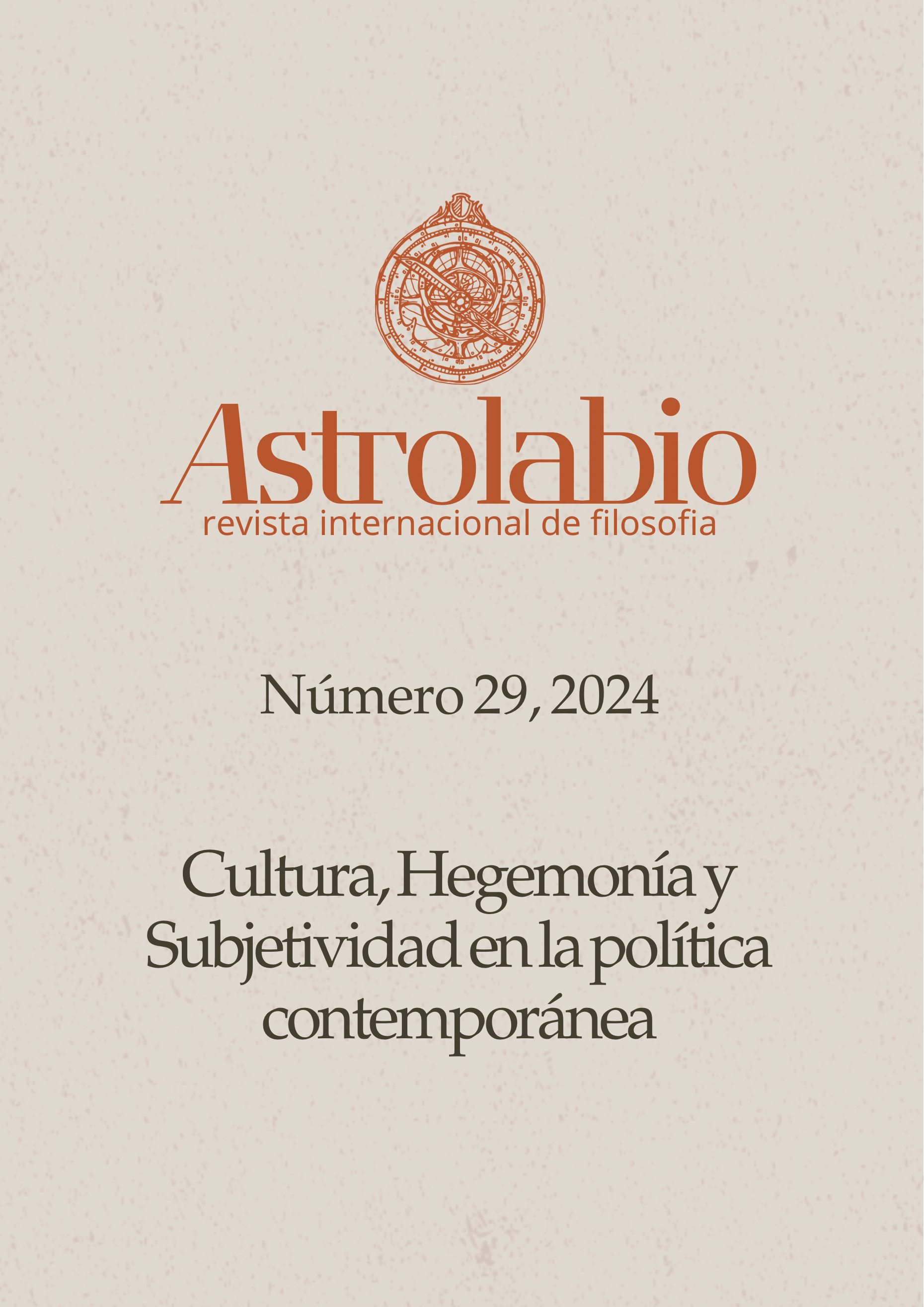Posthegemony and subalternity
the exhaustion of political concepts in Latin America
DOI:
https://doi.org/10.1344/astrolabio.v1i29.48104Keywords:
Hegemony, Subalternity, Decolonialism, Latin American Studies, MarxismAbstract
Processes such as the Chilean social uprising or the recent protests in Venezuela following the election results are some of the many examples in the recent history of Latin America that indicate the apparent exhaustion of the traditional mechanisms of state politics, as well as its political lexicon. Under this premise, within the decolonial turn, arose the reflection on the concept of post-hegemony. This concept appeared with the aim of rethinking Gramscian hegemony from cultural and decolonial studies, to question the relationship between the dominant and dominated classes. To this end, a series of theoretical reflections were developed that, starting from an amalgam of influences from contemporary political philosophy, sought, in turn, to rethink the channels of politics within the framework of the nation-state, and that placed the figure of subalternity at the center of the reflection. This article delves into the philosophical influences of post-hegemony, exploring through a hermeneutic-reconstructive review and the methodology of conceptual analysis, the amalgam of influences of contemporary political philosophy that question the channels of politics within the framework of the nation-state, and that place the figure of subalternity at the center of reflection, structuring thus the research that derives from this concept. This article provides an analysis of the emancipatory capacity of the concept of post-hegemony in its epistemological and theoretical character, and concludes certain lessons on the conceptual exploration that Latin American studies embark on when dealing with the postcolonial reality and the transformation of political life in the subcontinent, with the main objective of elucidating the theoretical idiosyncrasy that represents the philosophical framework of postcoloniality and the relationship that it has with the capacity for subversion against capitalism and Eurocentrism.
References
Arditi, B. (2007) Post-hegemony: politics outside the usual post-marxist paradigm. Contemporary Politics 13(3): 205–226.
Beasley-Murray, J. (2010). Posthegemony : political theory and Latin America. University of Minnesota Press. http://site.ebrary.com/id/10448695
Benjamin, W., & Echevarría, B. (2008). Tesis sobre la historia y otros fragmentos (1a ed). Itaca : Universidad Autónoma de la Ciudad de México.
Castro Orellana, R. (2015) Prólogo. Un itinerario. En Castro Orellana, R., Rivera García, A., & Villacañas, J. L. Poshegemonía: el final de un paradigma de la filosofía política en América Latina. Biblioteca Nueva: Madrid.
Castro Orellana, R. (2022). Poshegemonía, multitud y neoliberalismo. Res Publica. Revista de Historia de Las Ideas Políticas, 25(3), 361–373. https://doi.org/10.5209/rpub.77906
Cortés, M. (2020). Una pobre ontología del origen y la pureza: sobre Marx, marxismos y crítica decolonial en Gaussens, P. y Makaran, G. (eds.) Piel Blanca, máscaras negras: crítica de la razón decolonial, 145-174. Bajo tierra ediciones: Ciudad de México
Fanon, F. (2009). Piel negra, máscaras blancas (Vol. 55). Ediciones Akal.
Fitzsimons, A. L., & Starosta, G. (2018). Global capital, uneven development and national difference: Critical reflections on the specificity of accumulation in Latin America. Capital & Class, 42(1), 109-132. https://doi-org.bucm.idm.oclc.org/10.1177/0309816817692126
Garrido, A. (2022). (Pos) hegemonía y subalternidad: entre la crítica inmanente y el asedio fantasmal. Res pública. 25(3). 301-308
Gramsci, A., & Villacañas Berlanga, J. L. (2018). Pasado y presente: Cuadernos de la cárcel Barcelona: Gedisa.
Grupo Latinoamericano de Estudios Subalternos (1997). Declaración de fundación del grupo de estudios subalternos latinoamericanos. Procesos. Revista ecuatoriana de historia. No.10. 134-145.
hegemony, and geographical difference. Antipode, 51(5), 1474-1494.
Hesketh, C. (2019). A gramscian conjuncture in Latin America? Reflections on violence,
https://www.hrw.org/es/news/2024/09/03/venezuela-brutal-represion-contra-manifestantes-y-votantes
Human Rights Watch (2024) Venezuela: Brutal represión contra manifestantes y votantes
Kurz, R. (2016) El colapso de la modernización. Del derrumbe del socialismo de cuartel a la crisis de la economía mundial. Marat: Buenos Aires.
Laborde, A. (18 de octubre 2024): Minuto a minuto: así fue el estallido social del 18 de octubre de 2019 en Chile. El País. https://elpais.com/chile/2024-10-18/minuto-a-minuto-asi-fue-el-estallido-social-del-18-de-octubre-de-2019-en-chile.html
Laclau, E., & Mouffe, C. (1987). Hegemonía y estrategia socialista: hacia una radicalización de la democracia. Siglo Veintiuno.
latinoamericano actual, ed. Moreiras, A. y Villacañas, J.L. Madrid: Biblioteca Nueva,
Mignolo, W. (2007) El pensamiento decolonial: desprendimiento y apertura. Un manifiesto en Castro-Gómez, S. y Grosfoguel, R. (eds.) El giro decolonial: reflexiones para una diversidad epistémica más allá del capitalismo global. Siglo del Hombre editorial: Bogotá
Moreiras, A. (2001). The exhaustion of difference: The politics of Latin American cultural studies. Duke University Press.
Moreiras, A. (2006). Línea de sombra. El no sujeto de lo político. Palinodia: Santiago de Chile
Moreiras, A. (2020) Infrapolítica. Instrucciones de uso. La oficina ediciones: Madrid
Spivak, G. C. (2023). Can the subaltern speak?. In Imperialism (pp. 171-219). Routledge.
Svampa, M. (2015). Commodities consensus: Neoextractivism and enclosure of the commons in Latin America. South Atlantic Quarterly, 114(1), 65-82.
Svampa, M. (2019). Las fronteras del neoextractivismo en América Latina: Conflictos socioambientales, giro ecoterritorial y nuevas dependencias. Bielefeld University Press. https://doi.org/10.14361/9783839445266
Thomas, P. D. (2021). After (post) hegemony. Contemporary political theory, 20, 318-340.
Williams, G. (2017) “El giro subalternista” en Conceptos fundamentales del pensamiento. 227-245.
Downloads
Published
How to Cite
Issue
Section
License
Copyright (c) 2024 Alejandra Juárez González

This work is licensed under a Creative Commons Attribution 4.0 International License.
Total or partial reproduction of the works published in the Journal is permitted, provided the source is cited.
The copyright of the articles published in the Journal belongs to the authors, with first publication rights reserved for this journal. The articles will be distributed under the CC BY 4.0 license (Attribution 4.0 International).



